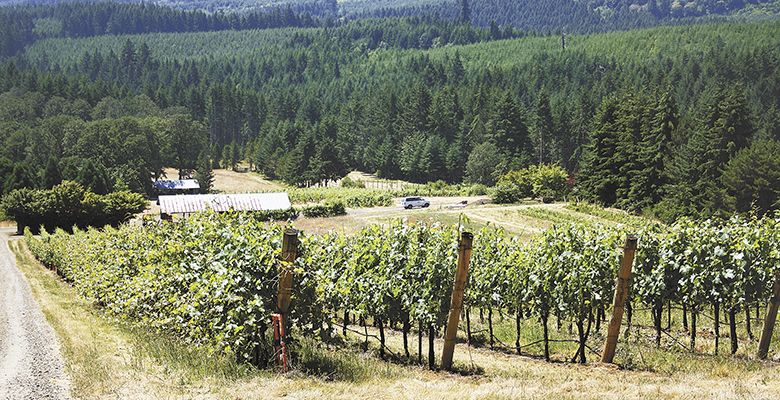OWRI Update
Research facility busy with co-industry projects
By Mark Chien
What’s happening at the Oregon Wine Research Institute? A little background first...
OWRI was created by an industry initiative in cooperation with Oregon State University. Its mission is to create a collaborative environment for OSU and USDA Agricultural Research Service faculty and associate members to perform research and extension education in the fields of viticulture, enology, plant pathology, integrated pest management and related disciplines. Our faculty not only performs research but also manages their research labs and programs, teaches undergraduate classes and mentors graduate students, along with a host of other responsibilities. They also collaborate with colleagues outside of the institute, usually at other universities and often overseas.
OWRI follows the “vine to wine” philosophy, in which research trials in the vineyard — such as studying vine nutrition — are harvested and made into wine; wine chemistry is then analyzed and sometimes carried through the sensory analysis process, even attempting to understand consumer preferences for differences exposed in vineyard or cellar practices. The practical benefit of this collaborative research is that the wine industry provides data and recommendations along multiple points of the production stream, allowing critical decisions to be made in the vineyard and cellar.
Most OWRI research projects are informed and guided by wine industry input, either at the personal level with faculty, or through formal channels like the Oregon Wine Standing Committee for Research, a branch of the Oregon Wine Board that serves as the interface between the wine industry and research projects.
OWRI faculty relies on OWB funding through its research committee to provide a stable base of funding for competitive research projects. In 2015, $257,000 from the grape tax was available for research; in addition, faculty members are continuously seeking additional sources of private and public funding to sustain their projects and programs.
The research at OWRI seeks to strike a balance between applied research with practical results that will benefit winemakers and grapegrowers, such as:
The statewide crop load trial, which over a span of ten years, will attempt to qualify ideal yields and contributors to vine balance in a group of commercial vineyards, and basic research that builds a foundation of new knowledge from which applied research can eventually emerge.
A large enology descriptive analysis terroir project is aiming to characterize wine descriptors of Pinot Noir wines from different AVAs in the Willamette Valley.
The study of air movement has OWRI researchers asking, “What if growers could monitor the dispersal of fungal spores, spray drift plumes or even evaporative water from grapevines in and around the vineyard?” Air travels in chaotic motion, but if we could understand the nature of turbulent air flow we could use simulation models to predict the path of particles moving around the vineyard.
Uniformity of grape maturity has always been considered a key to high-quality wines in Oregon, so understanding the mechanisms that control ripening may lead to practical recommendations in the vineyard to promote synchronous cluster maturity.
Other important current areas of research include the investigation of viruses and their vectors, including grapevine red blotch and leaf roll — both of which can be debilitating and chronic problems in vineyards — and understanding the biology and management of new invasive insects in vineyards, such a Brown Marmorated Stink Bug and Spotted Wing Drosophila.
Since 1987, the Woodhall Research Vineyard has been the site of many OSU viticulture projects. It is now
undergoing significant improvements, including a new two-acre Pinot Noir block that will begin as a vine-spacing and trellis trial to determine the effects of spreading the leaf canopy. After buildings, roads and access are upgraded, Woodhall should be ready for the next generation of research and teaching. Later this year, a search for a full-time vineyard manager for Woodhall will begin. This unique individual must blend management skills with the ability to assist faculty with their research work.
We value our partnerships and stakeholders. OWRI does not exist or autonomously. Key stakeholders include the donors who created OWRI and everyone who seeks to engage us. Partnerships range broadly, from the Erath Family Foundation that generously supports vital equipment purchases and research programs, in-kind donations from vineyard and winery businesses, and working relationships with essential organizations such as the Oregon Wine Board, Oregon Winegrower’s Association, ODA, and a host of other groups. We add tremendous value to our efforts by working with others.
OWRI acts in support of horticulture and viticulture extension faculty across the state, including eastern Oregon, the Columbia Gorge and southern Oregon, where a new research viticulturist is being sought for the Southern Oregon Research and Extension Center. Greater efforts are being directed at fulfilling the needs of these exciting and thriving wine regions of Oregon.

Mark Chien has been the program coordinator for the Oregon Wine Research Institute at Oregon State University since June 2014. Born in Delaware, Chien grew up in New England and received a psychology degree from Amherst College. He became interested in vines while traveling and studying in Europe. After returning to the U.S., he enrolled in the viticulture master’s program at the University of California at Davis. In 1999, Chien earned his master of education in agricultural extension and education from Penn State. He was the first winemaker and second vineyard manager at Pindar Vineyards, the largest winery on Long Island. Chien then managed Temperance Hill Vineyard in the Eola-Amity Hills for 16 years. He can be reached at mark.chien@oregonstate.edu or 541-737-1273.













